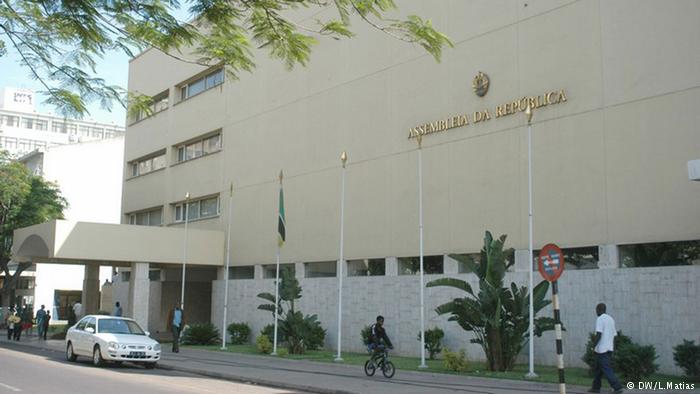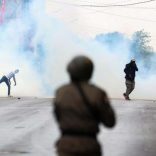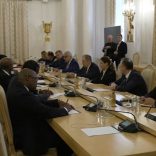Mozambique | Just In: Vitano Singano released from prison
Frelimo makes Assembly sitting conditional to demilitarisation of Renamo – AIM report

DW (File photo)
The parliamentary group of Mozambique’s ruling Frelimo Party has made the holding of an extraordinary sitting of the country’s parliament, the Assembly of the Republic, conditional on the demilitarisation of the main opposition party, the rebel movement Renamo.
Initially, the Assembly chairperson, Veronica Macamo, announced that the extraordinary sitting would be held on 21-22 June in order to amend legislation on municipalities and municipal elections to bring it into line with the constitutional amendments passed by the Assembly in May.
But on Wednesday, less than 24 hours before the extraordinary sitting was due to begin, the Assembly’s governing board, its Standing Commission, postponed the sitting and did not announce a new date. The Assembly’s Deputy Chairperson, Antonio Amelia, told a press conference that the delay was due to “internal aspects”, but failed to explain what these were.
On Thursday, after a second meeting of the Standing Commission, Amelia was more honest and admitted that the postponement was at the request of the Frelimo parliamentary group, which is insisting on the disarming of Renamo, or at least steps in that direction, before the municipal elections, scheduled for 10 October, can be held.
Frelimo, Amelia told reporters on Thursday evening, had submitted a request to the Standing Commission “for a delay in holding the extraordinary sitting due to the lack of progress in the dialogue with Renamo on military questions”.
Since the positions of Frelimo and Renamo had not grown any closer, said Amelia, the Standing Commission decided to delay the sitting and wait for advances in the demilitarisation of Renamo.
This took into consideration, he added, the fact that the country is approaching an election period when, in principle, all competing parties should be on a footing of equality, but the fact that one political force (Renamo) still has a military wing “could disturb the elections, ensuring that neither the candidates nor the public feel calm”.
“A date for the extraordinary sitting will only be fixed when there are advances in these questions that concern Mozambicans”, he declared.
Renamo has maintained an entirely illegal militia for the past two and a half decades. All Renamo forces should have been demobilised, along with the government army of the time, the FAM/FPLM, in 1994, when the new unified armed forces, the FADM, were set up.
Although the peace agreement between the government and Renamo allowed the rebel movement to keep a force of armed bodyguards to protect Renamo leaders during the transition period, this exception came to an end with the first multi-party elections in October 1994.
Since then the Renamo militia has been entirely illegal, but successive governments have tolerated it. The dangers of this tolerance became clear when Renamo resumed a low level insurgency in the central provinces in 2013, and again in 2015-16.
That insurgency ended when the Renamo leader, the late Afonso Dhlakama, declared a truce in December 2016. Since then there have been no further Renamo ambushes on the roads, and no clashes between government and Renamo forces.
Contacts, mostly by phone, between President Filipe Nyusi and Dhlakama, led to the establishment of two working groups between the government and Renamo – one negotiating decentralisation (particularly the election of provincial governors), and the other dealing with military issues. The latter were the demobilisation and disarming of the Renamo militia, and the inclusion of its members, either into the defence and security forces, or back into civilian life.
Full agreement was reached on decentralisation, leading to the package of constitutional amendments on provincial, district and municipal governance, which was passed in May. But there has been no breakthrough on the military issues.
Nyusi, however, believed he was making progress in his discussions with Dhlakama and that, had it not been for Dhlakama’s unexpected death from diabetes on 3 May, a deal on the military issues could have been finalised this month.
Both Nyusi and the Renamo general secretary, Manuel Bissopo, have confirmed the resumption of negotiation with the new Renamo leadership, headed by the party’s interim coordinator, Ossufo Momade. But it is not clear whether Dhlakama had kept the rest of the Renamo leadership informed of the state of his talks with Nyusi.
What is clear, however, is that not a single Renamo militiaman has been demobilised. Frelimo’s patience seems to have worn thin, and it appears determined not to allow yet another set of elections to take place when one of the competing parties still has an armed force of its own.
According to a report in Friday’s issue of the independent newssheet “Mediafax”, at a recent meeting of the Assembly’s Standing Commission, Frelimo demanded a signal from Renamo that it is indeed committed to disarming its men.
Frelimo demanded that Renamo hand over at least some guns to the defence and security forces, and a list of some names of the members of what are delicately known as the Renamo “residual forces”, in order to start dealing with their demobilisation.
Renamo, says “Mediafax”, asked for time for consultation. The exact nature of the Renamo response is not yet known, but the deadlock has obviously continued.
Renamo has tried in the past to argue that decentralisation and demobilisation are completely separate issues, but Frelimo has never accepted this. The two negotiating groups, on decentralisation and on military questions, were set up at the same time, and Nyusi always made it clear that they were part of one and the same package. In other words, there could be no final agreement until everything was agreed.
The impasse threatens the October municipal elections. Without amended electoral legislation, the elections cannot be held, and the existing law on municipal elections cannot be used, since it is now in contradiction with the Constitution, as amended in May.













Leave a Reply
Be the First to Comment!
You must be logged in to post a comment.
You must be logged in to post a comment.